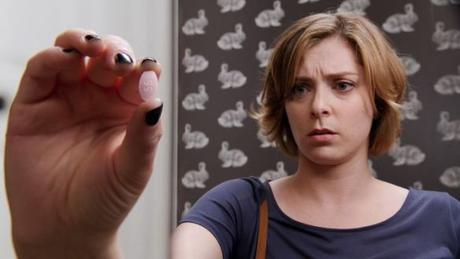Two shows I’ve been binging lately — and enjoying tremendously — open with the trope of the protagonist quitting mental health medication. Both United States of Tara and Crazy Ex-Girlfriend feature strong lead female characters struggling with their mental health. Both shows are noteworthy for their darkly comic, complex, honest presentations of mental illness. But they both lean on the shorthand device of the main character quitting medication.

“Going off your meds” could be called a sub-trope of the popular pilot plot line I call “First day of the rest your life.” I can’t say I’ve seen it a lot, but it appears in movies like Garden State. (If you have other examples, please tweet them to me @meek_the_geek.) It was subverted in the pilot of Wilfred, where Ryan decides to take all the meds.
For the uninitiated, United States of Tara centers on a woman in her late 30s (Toni Collette) dealing with Disassociative Identity Disorder (DID, previously known as multiple personality disorder). She has decided she’s not herself on her medication, so she risks unleashing her “alters” in an effort to, ironically, feel more like herself.
The fact that Tara is quitting her medication isn’t explicit in the pilot. You sort of figure it out through her confessional-style video diary.
Because USoT centers on such an unusual situation, the first episode can make for a Brechtian viewing experience, weighed down by comparisons to reality. The illness itself acted, for me at least, as a major distraction during the pilot. I kept questioning how realistic the portrayal was and wanting to brush aside certain aspects of the alters’ behavior.
After two episodes, I started reading up on DID, including a couple of posts that therapists wrote in reaction to the show. I was sold. Apparently, USoT is pretty accurate. So my advice is, don’t waste the mental energy trying to figure out the illness, just enjoy the ride.
Based on the seriousness with which the show treats her disorder, we can infer that a medical professional is overseeing the switch. We don’t hear any names of medications, and it’s not explained whether she went off all of them all at once. She definitely has the support of her husband and children. But, we don’t witness any withdrawal, just a return to the symptoms she apparently experienced in the past — namely two other personalities surfacing in response to stress.
Crazy Ex-Girlfriend‘s Rebecca flies solo. After bumping into a high school boyfriend while she’s in the throes of an existential crisis, the Harvard Law grad decides to move across the country. Under the ruse of needing a change of scenery, she denies following this cheerful ball of muscles to his tacky Inland Empire burg. Upon arriving, she’s so sure that she’s made the right choice, she dumps the meds. Literally.
This is another show that deftly handles mental illness and subverts expectations. But, the one moment I found grating in an otherwise brilliant pilot was the scene of Rebecca tossing no fewer than five bottles of pills ceremoniously down the kitchen sink. Now, granted, she’s unstable and bad decisions are her bread and butter. But if you just stop taking a bunch of brain chemistry-altering drugs bad stuff is going to happen. And not just that you’re going to be in the state of mind you were before the drugs.
Here’s just one article (from none other than Harvard), explaining what happens when someone goes off antidepressants. They list not only emotional symptoms but physical ones including dizziness, nausea and digestive issues.The length of time a drug takes to leave the body ranges from two and a half to 25 days, and the article advises a “slow and steady” taper.
Withdrawal is the component most TV shows ignore with the Going Off Your Meds trope. By ignoring physical symptoms, they’re also ignoring the physical causes, thereby selling one of the worst mental health stigmas, “It’s all in your head.” Showing a character dramatically throw away medication without any physical consequences might save time, but it’s a weak shortcut.
Both protagonists eventually revisit drug therapy for their respective illnesses. Again, USoT handles the question more responsibly and realistically than CEG. While both are comedic, CEG is a more wacky, over-the-top show — it’s a musical, for Yoda’s sake — but its treatment of drugs still bothers me. It’s just so damn near perfect that it shouldn’t succumb to this one weakness.
If you’re into this topic you may enjoy this article, “TV Shows That Got Mental Health Right.” Or this one, “TV Shows That Got Mental Health Issues Really, Really Wrong.”
